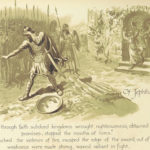We run our website the way we wished the whole internet worked: we provide high quality original content with no ads. We are funded solely by your direct support. Please consider supporting this project.

When Jesus Referred to Canaanites as “Dogs”
Last week I discussed Paul’s harsh language regarding his opponents, the worst example being his reference to certain opponents as “dogs” (Phil 3:2). I suggested that such language simply reflects the fact that Paul wasn’t perfect, as he himself admitted. Several people pushed back on this suggestion by pointing out that Jesus once referred to Canaanites as “dogs.” If Paul’s reference reflects his imperfection, doesn’t the same apply to Jesus? Today I will explain why I think it does not.
This strange episode is found in Matthew 15:21-28. Here we find a Canaanite woman pleading with Jesus to free her demonized daughter (v. 22). Jesus initially ignored her and his disciples urged him to send her away (v. 23). Despite this, and despite the fact that Jesus reminded her that Jews looked down on Canaanites as “dogs” (v.26), the lady persisted. As a result, Jesus praised this woman’s “great faith” and then granted her request (v. 28).
Now, some NT scholars who don’t accept the biblical witness to Jesus’ sinless nature (Heb 4:15) argue that this episode indicates that Jesus shared his Jewish culture’s racist view of Canaanites. And if Jesus actually intended his comment to disparage the Canaanites, I see no way of avoiding their conclusion. Moreover, since racism is a sin, we would have to consider the biblical claim that Jesus was sinless to be mistaken. On the other hand, if we accept that Jesus was without sin, we simply cannot believe Jesus intended his remark to disparage Canaanites. And in this case, it is incumbent upon us to explain what Jesus did intend by his remark.
To discern what Jesus was up to, we need to recall that Jesus was a descendant of King David (Matt 1:6), the paradigmatic, mighty warrior king at the height of Israel’s glory. We need to remember as well that the name “Jesus” is the Greek version of “Joshua” in Hebrew. In this light, some have argued that this exchange between the contemporary “Joshua” and a descendent of those whom the ancient Joshua attempted to exterminate suggests that Matthew intends this story to be read against the background of the conquest narrative.
Read in this light, it becomes apparent that by extending mercy to a descendent of the people whom the ancient Joshua had shown no mercy, this contemporary Joshua is subverting the “show no mercy” command of the conquest narrative. Hence, Philip Jenkins argues, in this exchange the story of the attempted annihilation of the Canaanites “comes full circle, and the extermination order is repealed” (Laying Down the Sword [HarperOne, 2011], 241).
This interpretation helps explain why Jesus tested the woman’s faith by bringing up the Jewish stereotype of Canaanites as “dogs,” which was itself part of the legacy of the conquest narrative. Engaging in what some have called “prophetic theater,” Jesus dramatically exposed the racial hostility that lingered from the violent conquest in order to dramatically reveal that faith in his barrier-crossing mercy overcomes this hostility and frees people from its demonic oppression.
In short, Jesus was role-playing when he referred to Canaanites as “dogs,” and he was doing this with the loving motive of freeing people from the racist curse that had persisted since Joshua’s bloody conquest of the land of Canaan. I can frankly see no similar motive at work in Paul’s disparaging reference to his theological opponents, which is why I conclude that Paul’s reference to “dogs” reflects his imperfection while Jesus’ reference does not.
Photo on VisualHunt
Category: General
Tags: Bible Interpretation, Cruciform Theology, Paul Copan
Related Reading

Podcast: Greg Introduces His Cruciform Hermeneutic at the CrossVision Conference and Dialogues with Rachel Held Evans
Greg Introduces His Cruciform Hermeneutic at the CrossVision Conference and Dialogues with Rachel Held Evans. http://traffic.libsyn.com/askgregboyd/Episode_0240.mp3

Does Hebrews 11 Praise Violence? A Response to Paul Copan (#2)
Once or twice a week, as time allows, I will be responding to criticisms of Crucifixion of the Warrior God (CWG) that were raised by Paul Copan in a recent paper that he delivered at the Evangelical Theological Society. In my first post in this series I responded to Copan’s claim that Paul’s quotation from…

One Word
While I’ve lately been pretty distracted finishing up Benefit of the Doubt (Baker, 2013), my goal is to sprinkle in posts that comment on the distinctive commitments of ReKnew a couple of times a week. I’m presently sharing some thoughts on the second conviction of ReKnew, which is that Jesus Christ is the full and…

What Does Spiritual Warfare Have To Do with the Cross?
Last week, we covered a few posts on the nature of the Atonement and the Christus Victor view. The following continues this theme, specifically looking the motif of spiritual warfare and how it relates to Christ’s work on the cross. This is an adaptation from Greg’s article in The Nature of the Atonement: Four Views. …

Jesus and Nationalistic Violence
Throughout the Old Testament, we find Israel spoken of as God’s “chosen nation.” The Israelites were to be a nation of priests whom God wanted to use to unite the world under him (Ex 19:6). Since nationalism and violence inevitably go hand in hand, as Jacque Ellul and others have noted, the covenant God made…

One Hope
When Jesus was crucified by his enemies instead of conquering his enemies, the hope of Jesus’ disciples came crashing down in utter despair. They had hoped that Jesus would establish the kingdom of God in the same way that other kingdoms were established. However, the resurrection reveals that the kingdom of God is not like…
